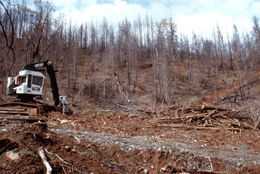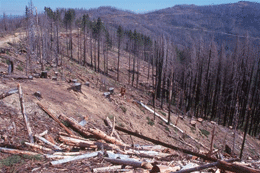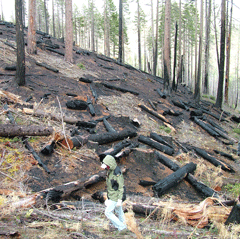The Politics of Salvage Logging
Air Date: Week of March 3, 2006

(Photo: D. DellaSala, WWF)
An attempt to censor a study in the journal Science has rekindled debate about logging after insects, wildfires, and storms damage forests. Living on Earth’s Jeff Young reports on the latest round in the fight over what to do with damaged forestlands.
Transcript
GELLERMAN: It’s Living on Earth. I’m Bruce Gellerman. The practice of removing trees from fire damaged forests is called “salvage logging.” It’s been going on for decades, but a new study in the journal Science – like many others before it – finds salvage logging can do long term harm to forest ecosystems. The latest research comes as Congress considers a bill that could greatly expand “salvage logging.” And as Living on Earth’s Jeff Young reports, some researchers and activists charge lawmakers are ignoring – even suppressing – the scientific evidence.
YOUNG: Daniel Donato is bookish, thin, not yet 30 years old – the kind of guy you’d expect to see crunching numbers at a computer, which is what he often does as a grad student at Oregon State University. He’s not the kind of guy you’d expect to see on the hot seat at a crowded and contentious Congressional hearing.
MAN: Do you solemnly swear, or affirm under penalty of perjury that the statements made and the responses given will the whole truth and nothing but the truth so help you God?

(Photo: D. DellaSala, WWF)
BAIRD: My judgment is that in this case Mr. Donato, the journal Science, and the reviewers of this article did not do their job.
YOUNG: Washington Democrat Brian Baird is co-sponsor of a bill with Oregon Republican Greg Walden to streamline rules and limit environmental review of salvage logging. Baird accused Donato of bias, of a lack of humility, and of misusing statistics.
Donato politely stood his ground.
BAIRD: It rank orders the variables of the plots of which ones are different. It ranks order the magnitude, but doesn’t tell the absolute magnitude. It just doesn’t.
DONATO: The median is a measure of central tendency of all nine plots beforehand and all nine after.
BAIRD: No, it’s not.
DONATO: Yes, it is,
BAIRD: It’s not.
DONATO: (Laughs) Yes, it is. I disagree.
[APPLAUSE, GAVEL]
YOUNG: It’s the latest round in the long battle over salvage logging. And it’s not the first fight over Donato’s study. A federal government agency briefly suspended funding for Donato’s research, and officials at his own school tried to stop his paper’s publication. After Science had accepted the peer-reviewed paper, some professors at Oregon State’s School of Forestry asked the journal to pull it.
DELLASALA: It really was an attempt at academic suppression that sent shock waves across the academic community, that if you don’t like somebody’s results you can try to block them. That is unheard of.
YOUNG: That’s Dominick DellaSala, a forest ecologist with the environmental group World Wildlife Fund. He says the incident raised questions about academic freedom in a college that gets ten percent of its budget from a tax on timber, and received a million dollar endowment from a salvage logging company. DellaSala opposes salvage logging, and Congressman Walden’s bill. He says Donato’s study is just the latest in a large body of work showing how logging after fires hurts forest recovery.

(Photo: D. DellaSala, WWF)
YOUNG: DellaSala says salvage logging can erode soil, silt up streams and mar wildlife habitat. Richard Hutto directs the University of Montana’s Avian Science Center, where he’s studied birds in burned forests.
HUTTO: There’s not one single bird species that has increased in abundance or benefited from post-fire salvage logging. Not one.

Post-fire logging soil impacts, Bisucit area (Photo: Chris Frissell, Pacific Rivers Council)
WALDEN: And the science I’ve read, it would indicate that if you’re going to remove trees you’re better to do it quickly.
YOUNG: Walden says his bill doesn’t instruct forest managers to cut or not to cut. It simply speeds up the process if managers decide to clear forests damaged by fire, insects, wind or ice storms.
WALDEN: Right now, it can take upwards of three years after a forest fire in the west before the Forest Service is, if they choose to go in and cut a burned dead tree, able to go in and cut a burned dead tree.
YOUNG: Where trees are timbered, some of the money would go for restoration and follow-up study. Critics say this eliminates endangered species protections and full environmental review before cuts – a blow to forest protection and a boon to the forestry industry. Salvage logging has become an important source of timber revenue, accounting for roughly half the timber cut on Forest Service land in the northwest And forestry is Walden’s top source of campaign donations from industry. Campaign finance records and recently published reports show he’s taken 300,000 dollars from timber interests. But Walden insists that has nothing to do with his bill.
WALDEN: I find that offensive. I don’t look at a newspaper reporter and say, look who’s buying ads in their paper, therefore they’re biased, do I? Who gives to NPR? Does that affect your reporting? No. And who gives to me doesn’t affect my legislating.
YOUNG: A vote on Walden’s bill is expected soon in the House Resources Committee where both supporters and opponents argue that the science is on their side in this still smoldering debate. For Living on Earth, I’m Jeff Young in Washington.
Links
Living on Earth wants to hear from you!
Living on Earth
62 Calef Highway, Suite 212
Lee, NH 03861
Telephone: 617-287-4121
E-mail: comments@loe.org
Newsletter [Click here]
Donate to Living on Earth!
Living on Earth is an independent media program and relies entirely on contributions from listeners and institutions supporting public service. Please donate now to preserve an independent environmental voice.
NewsletterLiving on Earth offers a weekly delivery of the show's rundown to your mailbox. Sign up for our newsletter today!
 Sailors For The Sea: Be the change you want to sea.
Sailors For The Sea: Be the change you want to sea.
 The Grantham Foundation for the Protection of the Environment: Committed to protecting and improving the health of the global environment.
The Grantham Foundation for the Protection of the Environment: Committed to protecting and improving the health of the global environment.
 Contribute to Living on Earth and receive, as our gift to you, an archival print of one of Mark Seth Lender's extraordinary wildlife photographs. Follow the link to see Mark's current collection of photographs.
Contribute to Living on Earth and receive, as our gift to you, an archival print of one of Mark Seth Lender's extraordinary wildlife photographs. Follow the link to see Mark's current collection of photographs.
 Buy a signed copy of Mark Seth Lender's book Smeagull the Seagull & support Living on Earth
Buy a signed copy of Mark Seth Lender's book Smeagull the Seagull & support Living on Earth

